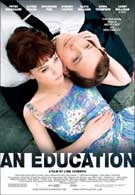There's a natural human fascination with time periods immediately before a huge change, whether it's America before the Civil War or Jerusalem before the birth of Christ. But lately it seems nothing interests us more than the early 1960s, the period that more closely resembled the 50s before it than any of the massive cultural changes that were about to take place. We see it every week on AMC's Mad Men, and there's a British equivalent in Lone Scherfig's exquisitely made An Education, a film about life in England after the war but before the Beatles, in which none of the characters can even fathom the change that's to come.
That includes main character Jenny (Carey Mulligan), a smart 16-year-old who thinks she understands what the world has in store for her, with her best hope for a good life relying on attending Oxford and meseting a suitable husband. Living in a tiny house with her fiercely middle class, money-obsessed parents (Alfred Molina, wonderful, and Cara Seymour), Jenny dreams, like so many small-town girls before and after her, of not only studying great art and culture, but actually living it.
As coming directly out of a fantasy, in sweeps David (Peter Sarsgaard), a handsome older man who offers Jenny and her cello a ride home one day, and soon is sweet-talking her parents into allowing her to join him at nightclubs, opera performances, and even weekend trips to Oxford. Accompanied by his suave friend Danny (Dominic Cooper) and Danny's ditzy, gorgeous girlfriend Helen (Rosamund PIke), David adores Jenny but doesn't take advantage of her, and it's unsurprising that her parents soon overcome their misgivings-- not only is he older, but a Jew-- and count on David, not Oxford, to secure Jenny's future.
There aren't very many twists in An Education's plot, but they're best discovered on their own; director Lone Scherfig allows the audience to experience Jenny's coming-of-age as she does, feeling alongside her the inevitable hurts, exhilarations and misunderstandings that result when you have the brain of an adult, but not necessarily the emotional intelligence to understand it. It is practically universally acknowledged by now that Mulligan is a wonder as Jenny, but watching her completely unforced transformation from child to adult is one of those rare, star-is-born moments that seems lifted from another era. Mulligan is surrounded by a ridiculous amount of talent, from Molina to Emma Thompson to Sally Hawkins in a tiny role, but her performance guides the film and lifts it from something merely well-made and pleasant into an actual marvel.
Not to say that the film is nothing without Mulligan. With a script from Nick Hornby and Scherfig's innate, human understanding of her characters, this specific coming of age story (based on journalist Lynn Barber's real life) set in a specific time feels strikingly universal. Even if none of us were ever swept away to Paris by a charming older man, maybe that trip to the Dairy Queen in your older brother's friend felt like the same thing. We like to think of it as specifically American, the fantasy of the boy, the car, the open road, but An Education serves as a glimpse into another version of that ideal for the outsiders, and probably a delicately rendered look back for those who were there.
If it had been able to take a few more liberties with the past, diverting from Barber's story for a more satisfying narrative, An Education might have been something truly perfect. Scherfig mines great comedy and pathos from the mundane details of Jenny's corner of England, but the film feels a bit conventional as well, a bit too similar to every coming-of-age revelation we've seen on film before. This version stands above many of the others, but the period setting itself doesn't contain enough of that extra wallop that would make the film feel different.
But as a story about women and how we grow up, as a chronicle of a specific time and place that feels like an island from the rest of history, and as a chance to see some of the year's finest acting, An Education is the rare period piece that has a real heart beating underneath it. See it for Mulligan, stay for the surprising emotional honesty, even if it's all in service of a too-neat narrative in the end.











